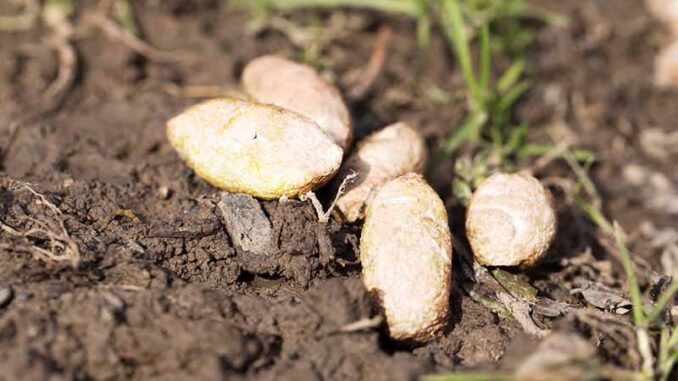
This article was updated on January 24th, 2024
Veterinarians see a lot of different colored dog poop, but one color that might surprise dog owners is white. It can either be completely white or have white spots in it. In this article, our veterinarian Dr. Chyrle Bonk, explains why this happens and what you should do.
When is White Dog Poop Not a Concern?
There can be the occasional one-and-done cases of white dog poop, so if this is the first time you’ve seen it and your dog is acting normally, you may choose to monitor it for a day or two. Dr. Bonk explains:
“Even though any discoloration to your dog’s poop may be alarming, there are certain times when white dog poop is no big deal. If the consistency of the feces is normal, you only notice it once, or your dog isn’t showing any other signs, chances are his white poop isn’t a cause for concern. “
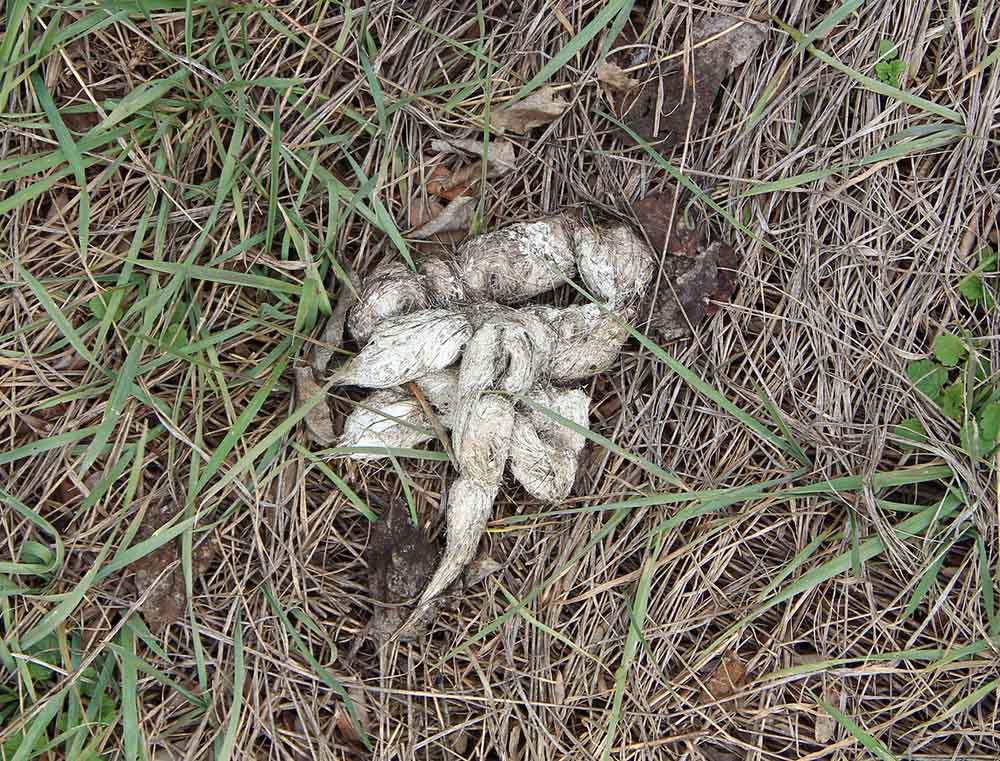
Causes of this type of white poop with normal consistency may be:
1. Old poop that’s leached in the sun: Dog poop tends to turn white with age. A few days out in the sun can cause pigments to break down, leaving white dog poop behind. High humidity can also bring on mold growth that will give dog poop a white appearance.
“If you have a lot of old, white dog poop in your yard, it’s time to clean up. Leaving dog poop around can transmit internal parasites and increase the likelihood that your dog will experimentally try to eat it.”
2. Side effect of a medication: There are a few medications that may cause your dog’s poop to turn white. The main one is barium. Liquid barium is used by veterinarians in imaging studies because it shows up on an x-ray. Barium may be given to your dog to better visualized the digestive tract, analyze swallowing and digestion time, or to visualize the bladder. If your dog has recently been given barium, expect some white poops until it clears the system, usually within a day or two.
When is White Dog Poop a Problem?
If you know that the white dog poop you just saw is fresh and your pup hasn’t had any recent medications, it’s time to dig a little deeper. Dr. Bonk explains:
“The consistency, odor, frequency and other signs that your dog may be showing can help clue you in. Any white dog poop with abnormal consistency should warrant a veterinary visit. Runny or greasy white dog poop can indicate something serious going on with your dog’s digestive system that will need to be diagnosed and treated by a professional.”
Note any change in appetite, weight loss, vomiting, or lethargy. Also, dog poop with white spots or specks is a common issue that can be resolved with a quick veterinary visit
Possible reasons include:
1. Your dog ate something he shouldn’t have: Puppies are the main culprits for this type of white dog poop, however, any dog may have an issue. Eating something white can also turn dog poop white. Crayons, socks, or landscaping rocks can all cause white dog poop. You will likely see the white object in the feces, so expect it to be a little lumpy or misshapen in consistency.
Depending on the object, your dog may also show signs of:
- vomiting,
- decreased appetite,
- a painful abdomen, or
- constipation.
It’s best to have a vet check this one out as you never know what else he may have gotten ahold of and larger, undigestible objects may require surgical removal.
2. Too much calcium in the diet: High-quality commercial dog foods should contain the proper amount of calcium, not too much and not too little. However, if you’re feeding your dog a raw or homemade diet, he may be getting too much calcium which can lead to white dog poop.
High calcium can be a concern in growing puppies, so it’s important to make sure your homemade diet is complete and balanced. Consult your veterinarian or a veterinary nutritionist to formulate an at-home recipe.
3. Internal parasites: If you’re noticing white specks in your dog’s poop, you’re probably dealing with internal parasites. Don’t worry, your dog isn’t alone in this one, 1/3 to ½ of dogs carry some kind of internal parasite around at any given time.
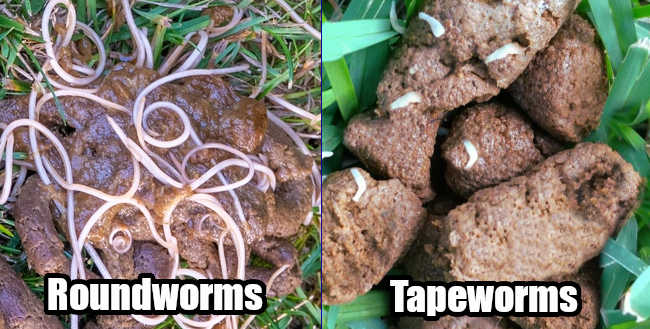
On closer look, worms may look like thin spaghetti noodles or grains of rice, depending on the worm species. The feces may look normal or have a runnier consistency. Learn more about worms in dog poop.
4. Digestive issues: Anytime your dog’s digestive system is out of whack, you may see some abnormal poop. White poop is no different. White poop may get its color from excessive mucous or from improper digestion.
Issues with the intestines, liver, pancreas, and gallbladder may all produce white or grey dog poop. It may also be greasy, mucousy, runny or soft. Dogs may also vomit, not want to eat, lose weight, or have yellowing of the skin and eyes. Any of these issues require veterinary intervention as they can become very serious very quickly if left untreated.
Important Factors to Consider
White color aside, when deciding whether your dog’s poop is a problem, you’ll want to look at its other features as well:
- Consistency,
- odor, and
- frequency
All the above factors may help your vet identify the cause of white dog poop. Along with that, you’ll want to take note if your dog is showing any other signs that will help guide you as to whether your dog’s white poop is a cause for concern or not. Things like vomiting, decreased appetite, lethargy, weight loss, and a poor hair coat are other signs that may accompany white dog poop or dog poop with white specks.
What Should You Do If Your Dog’s Poop is White?
One white dog poop is usually not going to be an issue. However, if white dog poop becomes a pattern, it’s time to start doing something about it.
- First thing’s first, if you’re noticing a lot of old, white dog poop in your yard, get your pooper scooper to work! Cleaning up old dog feces will help prevent the spread of internal worms, bacteria, and keep your dog from eating it.
- If your pup recently had barium from your veterinarian, just wait it out. The white poop should pass within a day or two.
- If you know your dog ate something white, contact your vet. Depending on what it is and the size, they may have your dog try to pass it or they may provide a little assistance. Larger objects may need surgical removal and end up costing you $1,000-$2,000. Keep your garbage locked up and store laundry and other small items well out of reach.
- Make sure your raw or homemade diet is complete and balanced without too much calcium. While high calcium diets may cause white dog poop and constipation in adult dogs, they can be very detrimental to a puppy’s skeletal development.
- Get those white specks checked out by a vet. Bring a sample of the dog poop with white specks and your dog to the vet for a fecal and deworming prescription. Look to pay $50-$150.
Now, if your dog is having other signs, such as vomiting, diarrhea, abdominal pain, weight loss, or not wanting to eat, you may be looking at something more serious. Issues with the liver, pancreas, gallbladder, or intestines can all lead to dog poop that is white, mucousy, greasy, or runny. There aren’t any at-home treatments for these kinds of issues, so get your dog to the vet.
Diagnosis & treatments
Your vet will run diagnostics such as blood work, imaging, and fecal tests to determine the cause. Treatment may include a diet change, antibiotics, fluids, anti-inflammatories, supplementation, or surgery. The cost could be anywhere from $200 to over $2,000.
More Tips
- Monitoring your dog’s poop every day is one of the best ways to catch any abnormalities early on.
- One abnormal bowel movement without any other signs is usually nothing to worry about. However, repeat abnormalities or other signs warrant looking into.
- Your vet may ask for an annual fecal sample to screen for internal parasites and other issues.
Read More About Dog Pooping Issues:

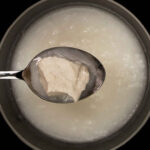


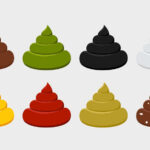
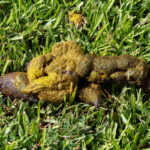
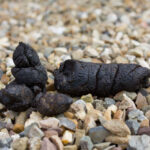
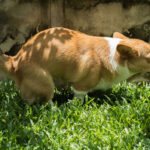


Disclaimer: This website's content is not a substitute for veterinary care. Always consult with your veterinarian for healthcare decisions. Read More.



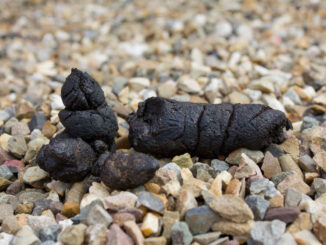
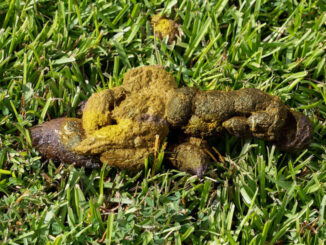

This was an eye-opening read! I always thought white dog poop was just a weird quirk of some dogs, but I had no idea it was linked to their diet and health. Thanks for breaking it down so clearly! Now I’m definitely going to keep an eye on my pup’s food choices.
I never knew white dog poop had such interesting reasons behind it! It’s surprising how diet and health can affect something as simple as their waste. Thanks for sharing this info—I’ll definitely be more mindful about my dog’s diet now!
Great article! I never knew that white dog poop could be a sign of a health issue. It’s good to know what to look out for and how to keep my pup healthy. Thanks for the tips!
This was such an interesting read! I had no idea that diet plays such a big role in the color of dog poop. I’ve noticed my dog’s poop being pale and was a bit worried, but now I understand what to look for. Thanks for the informative tips on what to do!
I never knew that the color of dog poop could relate to their diet and health! This was a really informative post. It’s good to know that white dog poop can be a sign of certain health issues or dietary imbalances. I’ll definitely keep an eye on my pup’s poop moving forward! Thanks for sharing!
This is such an interesting read! I never knew that the diet could have such a direct impact on a dog’s poop color. I’ll definitely be more mindful of my dog’s nutrition from now on. Thanks for the great tips on how to address the issue!